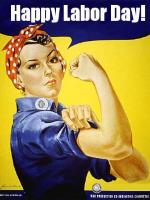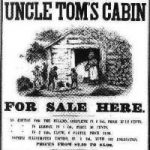 Happy labor day, comrades! Do you know why labor day is today and not on May Day — International Workers’ Day? Well, it’s because of the commies and anarchists. President Grover Cleveland was afraid of associating the international worker movements with the American movements. Of course, Cleveland wasn’t all that keen on the labor movement. But he made Labor Day a national holiday! Why? Because he was trying to make nice after totally screwing up in the government’s response to the Pullman Strike.
Happy labor day, comrades! Do you know why labor day is today and not on May Day — International Workers’ Day? Well, it’s because of the commies and anarchists. President Grover Cleveland was afraid of associating the international worker movements with the American movements. Of course, Cleveland wasn’t all that keen on the labor movement. But he made Labor Day a national holiday! Why? Because he was trying to make nice after totally screwing up in the government’s response to the Pullman Strike.
This is an interesting but totally typical story. The Pullman Company made railroad cars. Following the Panic of 1893, Pullman lowered worker wages. There is nothing especially wrong with this. It can be much better than laying workers off. Of course, Pullman did lay off workers. It probably only lowered wages because it had an excuse. But all that was probably okay.
The problem was that the workers lived in a company town. They paid the company for rent and food and more. But when the company lowered wages, it did not lower the cost it was charging workers for their necessities. The workers were, not surprisingly, unhappy about this situation. But George Pullman refused to lower his company town prices and refused to even arbitrate the matter.
 Notice the situation here: Pullman thought that his workers should suffer because of the bad economic conditions. But he didn’t think he should suffer at all. During the first years following our financial crisis and the bursting of the housing bubble, there was endless repetition that what the country needed was “shared sacrifice.” But if you dug down even a little into these pleas, you saw that it was all sacrifice by the lower classes — none by the upper. For example: we heard constantly that we had to cut Social Security, but we couldn’t even mention raising the payroll tax cap. (That would be class warfare!) The bankers were bailed out without much fuss but homeowners were just left to their foreclosures. And there were large cuts to social programs but only a tiny increase in the very top marginal tax rate and only because it was going up anyway.
Notice the situation here: Pullman thought that his workers should suffer because of the bad economic conditions. But he didn’t think he should suffer at all. During the first years following our financial crisis and the bursting of the housing bubble, there was endless repetition that what the country needed was “shared sacrifice.” But if you dug down even a little into these pleas, you saw that it was all sacrifice by the lower classes — none by the upper. For example: we heard constantly that we had to cut Social Security, but we couldn’t even mention raising the payroll tax cap. (That would be class warfare!) The bankers were bailed out without much fuss but homeowners were just left to their foreclosures. And there were large cuts to social programs but only a tiny increase in the very top marginal tax rate and only because it was going up anyway.
More desperate than we are today, many of the workers joined Eugene Debs’ American Railway Union (ARU). And they went on strike. It got ugly. Union members eventually stopped railroad service in a number of places. Then Grover Cleveland used the interruption of mail delivery to justify sending in federal troops. This did eventually end the strike — at a loss of 30 striker lives and almost twice as many wounded. This is generally the way it goes.
The government does not like organized labor. It is too much of a threat to the status quo. When organized, workers have enormous power. That was why, in 1947, we got the Taft–Hartley Act, which outlawed “jurisdictional strikes, wildcat strikes, solidarity or political strikes, secondary boycotts, secondary and mass picketing, closed shops, and monetary donations by unions to federal political campaigns.” And after that, Reagan savaged unions and basically made the remaining union rights void through lack of enforcement.
 In 1894, of course, the government was scared. Grover Cleveland and the rest of the government wanted to make nice with organized labor. They probably had Louis XVI of France in mind and were trying to hedge their bets. So only six days after the strike ended, Cleveland signed the legislation making Labor Day a federal holiday.
In 1894, of course, the government was scared. Grover Cleveland and the rest of the government wanted to make nice with organized labor. They probably had Louis XVI of France in mind and were trying to hedge their bets. So only six days after the strike ended, Cleveland signed the legislation making Labor Day a federal holiday.
As for old George Pullman, well, a national commission was appointed to look into the causes of the strike. It found Pullman culpable and said his company town was “un-American.” In 1898, the company was forced to sell off the land, which became part of Chicago. It didn’t matter to George Pullman, however; he died the year before.
After the strike, Debs was arrested and charged with conspiracy to obstruct the mail. You know: it wasn’t enough to have your strike crushed; Debs was a little man and so the government needed to crush him too. But Debs was represented by one of the great heroes of that period: Clarence Darrow. Darrow argued that Debs didn’t conspire to do anything and that it was the railroad that conspired against the workers. This is something that doesn’t seem to be understood by my libertarian enemies who almost to a man hate unions: if workers aren’t able to organize, it isn’t fair; the company management is very organized.
The prosecutors saw they were going to lose the case, so they dropped the conspiracy charge. Debs was later convicted on the lesser charge of violating a Supreme Court injunction and was given six months in jail. Although he entered jail what we might call a liberal, he left a socialist. While in prison he read a whole bunch of Marx and that changed his outlook. He was also influenced by visits from Victor L Berger. Along with him and others, Debs founded the Social Democratic Party of America. He went on to run for president as a socialist five times — the last time in 1920, he did from prison. He was serving a ten year sentence for violating Obama’s favorite law, the Espionage Act of 1917. He violated it by giving a speech that “obstructed recruiting” for World War I.
In 1921, The Bridgemen’s Magazine wrote:
So enjoy your Labor Day. But don’t forget the suffering and loss that it represents. And don’t stand for people like Eric Cantor showing such great disrespect to it. We know conservatives hate the labor movement. We know that many so called liberals are at best apathetic towards the labor movement. But the least we can demand is that they all show a modicum of respect one day of the year. Now go enjoy your barbecue or whatever.





